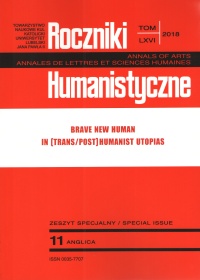Trans/Post-humanist Poetics in Jeanette Winterson’s The Stone Gods
Abstrakt
Poetyka trans-/posthumanizmu w Kamiennych bogach Jeanette Winterson
Pośród licznych paradygmatów filozoficznych oraz kulturowych, teoria transhumanizmu oraz posthumanizmu znacząco uwypukla wpływ postępu technologicznego na pojęcie człowieczeństwa. Chociaż rozbieżne konceptualnie, te dwa podejścia teoretyczne służą odpowiednio do zarysowania utopijnego oraz dystopijnego modelu świata w powieści Jeanette Winterson’s The Stone Gods (2007), w której technologia prowadzi zarówno do postępu jak i do destrukcji. Rozpoczynająca się od ukazania zaawansowanej technologicznie planety Orbus powieść Winterson stopniowo projektuje obraz świata na skraju ekologicznej katastrofy, w którym odczłowieczone społeczeństwo obsesyjnie poddaje się manipulacjom genetycznym. Bazując na poetyce transhumanizmu oraz posthumanizmu, praca omawia wpływ technologii na tradycyjne pojęcie kategorii człowieka. W swojej dystopijnej wizji technicyzacji świata oraz ludzkiej egzystencji, Winterson nie tylko ukazuje postępującą dehumanizację społeczeństwa, ale jednocześnie w posthumanistycznej formie relacji między ludźmi i maszynami upatruje możliwości uniknięcia katastrofy gatunku ludzkiego.
Bibliografia
Braidotti, Rosi. The Posthuman. Cambridge: Polity Press, 2013. Print.
Bostrom, Nick. “Transhumanist Values.” Ethical Issues for the 21st Century. Ed. Fredrick Adams. Philosophical Documentation Center Press, 2004. 3–14. Print.
Doelzal, Luna. “The Body, Gender, and Biotechnology in Jeanette Winterson’s The Stone Gods.” Literature and Medicine, 33.1 (2015): 91–112. Print.
Graham, L. Elaine. Representations of the Post/human: Monsters, Aliens and Others in Popular Culture. Manchester: Manchester University Press, 2002. Print.
Halberstam, J. and Livingston, I., eds. Posthuman Bodies. Bloomington: Indiana University Press, 1995. Print.
Hauskeller, Michael. Mythologies of Transhumanism. Basingstoke: Palgrave Macmillan. 2016. Print.
Hauskeller, Michael, Thomas D. Philbeck and Curtis D. Carbonell. “Posthumanism in Film and Television.” The Palgrave Handbook of Posthumanism in Film and Television. Ed. Michael Hauskeller, Thomas D. Philbeck and Curtis D. Carbonell Basingstoke: Palgrave Macmillan, 2015. 1–7. Print.
Huber, Irmtraud Literature after Postmodernism. Reconstructive Fantasies. Palgrave Macmillan, 2014. Print.
Roco, C. Mihail, Bainbridge S. William. Converging Technologies for Improving Human Performance. Dordrecht Savulescu: Springer, 2003. Print.
Roden, David. Posthuman Life: Philosophy at the Edge of the Human. New York: Routledge, 2014. Print.
Timmer, Nicoline. Do You Feel It Too? The Post-postmodern Syndrome in American Fiction at the Turn of the Millennium. Amsterdam: Rodopi, 2010. Print.
Winterson, Jeanette. The Stone Gods. London: Penguin, 2008. Print.
Yazgünoğlu, Kerim Can. “Posthuman Meta(l)morpohoses in Jeanette Winterson’s The Stone Gods”, Econon@ 7.1 (2016). 144–160. Print.
Copyright (c) 2018 Roczniki Humanistyczne

Utwór dostępny jest na licencji Creative Commons Uznanie autorstwa – Użycie niekomercyjne – Bez utworów zależnych 4.0 Międzynarodowe.





